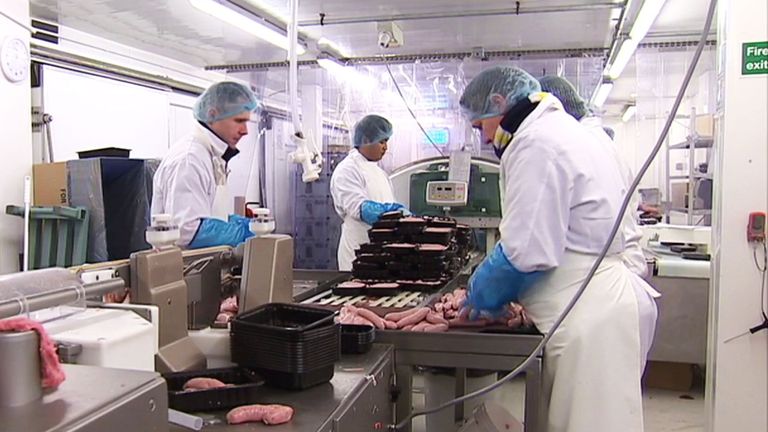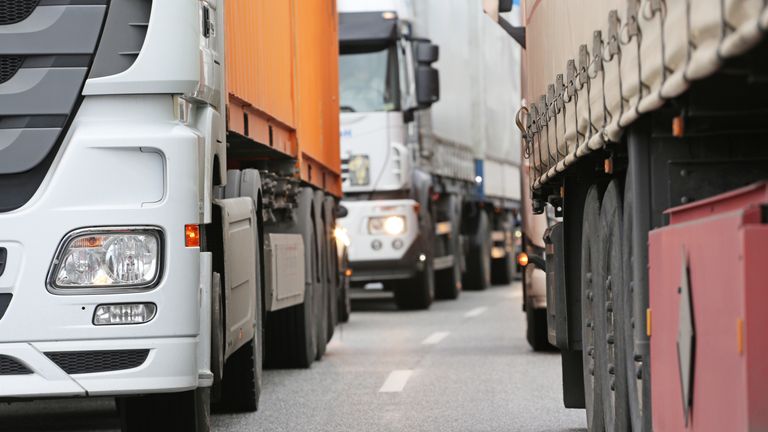‘No point’ sparing food suppliers from pingdemic when shop workers still absent says retailer
Business leaders have expressed dismay at being left out or left in the dark over plans to ease “pingdemic” pressure on key parts of the economy.
A government list of 16 industries will excuse “critical” staff from having to self-isolate if “pinged” by the NHS COVID app – but several sectors have been left out and others that are included say they need to know more details – and quickly.
Notably, food production and depot workers were on the list but supermarket shop staff were not – a decision which one boss, Iceland managing director Richard Walker, said left him “deeply disappointed”.
Mr Walker said: “The food supply chain only works if teams are in place to support at each stage – there’s no point in fixing the manufacturing and logistics issues if there is no one to put products on the shelves, serve customers at the till and deliver to their homes.”
The decision on Thursday night on which sectors could allow workers in to keep the economy moving came after a growing number of major businesses reported disruption to grocery and fuel supplies due to staff shortages.
It was stressed that individual firms would have to get the green light from the government via letter in order to grant essential, named, COVID-free staff in for work purposes if they were supposed to be in precautionary quarantine.
Sectors on the list included energy, food production and supply and “essential” transport.
But a spokesman for the Road Haulage Association said the guidance was “confusing and tangled in red tape” – at a time when hauliers are already struggling with staff issues.
“We cannot afford to lose healthy logistics staff to self-isolation when we’re already short of 100,000 HGV drivers.
“The pingdemic is putting even more pressure on our creaking supply chain,” the spokesman said.
Nick Allen, chief executive of the British Meat Processors’ Association, told Sky News that firms “desperately need” detail in order to implement the government’s guidance and said this was apparently not going to come until Monday.
He appealed for a greater sense of urgency in dealing with the problem.
Trade groups in some of the notable parts of the economy to be left out – such as hospitality or the wider manufacturing sector – did not immediately speak out.
Separately, it was hoped that a daily contact testing scheme would free up 10,000 food supply workers currently isolating to ensure the nation’s supermarkets remained stocked.
Publication of the list and testing regime followed a desperate plea from business leaders for the government to bring forward the easing of rules for the fully vaccinated from next month, arguing they were closing the economy down.
Just hours earlier, it emerged that over the past week more than 600,000 people in England alone had joined the ranks forced out of workplaces and back home for 10 days.
Supermarkets, meat producers and other factories, pub chains and even car plants were among those to report supply problems – with the boss of Iceland even urging shoppers not to stockpile as a small number of shelves and freezers ran short on some stocks.
Ian Wright, chief executive of the Food and Drink Federation, said: “The last few days of uncertainty have been a period of great disruption for the food and drink supply chain.
“It is clear that the government has listened to industry’s concerns and the recent announcement of exemptions from isolation, which includes food and drink manufacturers, is welcome.
“The devil is in the detail so we will continue to look into the guidance and further understand how the scheme will work.”
The British Retail Consortium insisted disruption was “limited” currently and it was working with the government to identify hundreds of key distribution sites for the contact testing scheme.
But chief executive Helen Dickinson added: “Government will need to continue to listen to the concerns of the retail industry in the coming days and must be prepared to take further action if necessary.”
Retailers including the Co-op and Iceland are planning to take on thousands of extra workers to offset the crisis.
Yet that comes at a time when demand for labour is high following the reopening of the economy.
In a new report the Recruitment and Employment Confederation said that “many businesses are really struggling to find the staff to fill vacancies”.


